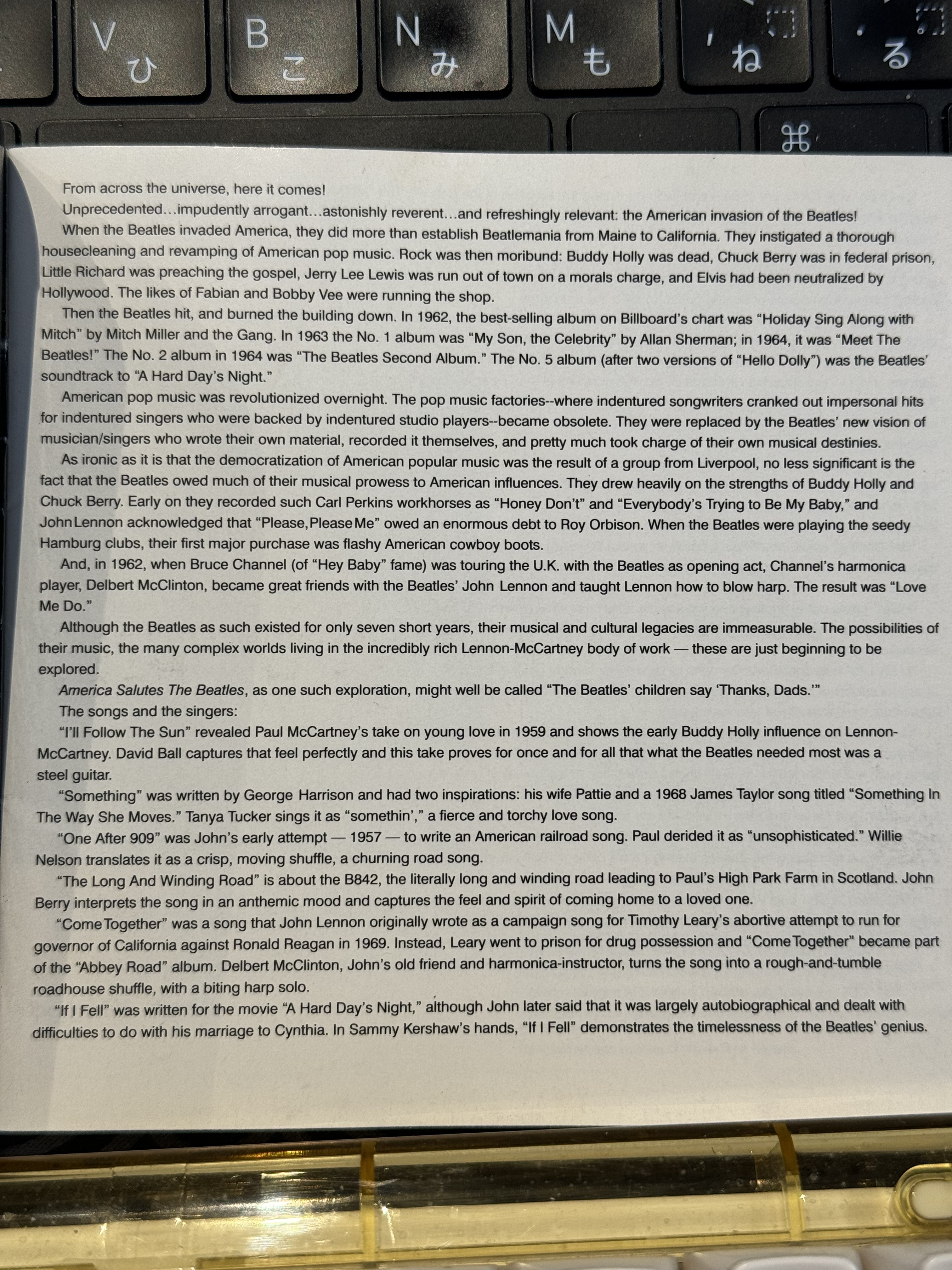Sound track 16 & 17
关于打口CD,我在维基百科上找到了比较全面的说明词条 打口:
打口是指西方市場積壓的音像製品處理後被作為塑料垃圾進口,卻以音像製品的身份在中國各地的非主流渠道進行流通,源於上世紀九十年代初,是中國特有的一種文化產物和文化現象,在東歐、拉美及西方國家內部也一定程度的存在。
一直以来我都以为这是进入我们海关后被因为非法走私截获的商品,而海关在象征性销毁后进行私下的二次流通牟利,却不料真相是从根源上就是作为塑料垃圾进口的。

很久以前我有一张打口CD,我只记得叫”Come together”,差不多是1996,1997之间的事情,我跟我爸去沈阳的大西电子市场买VCD,在众多打口CD摊位上,我找到了为数不多的一张勉强认识的英语封面,我当时念成了Come to get her,心里想着这是要把谁接走呢。那是我第一次比较完整地听Beatles的歌,我当时觉得都十分好听,而且很容易学,彼时没有互联网,我是快上大学前才知道那一整张其实都是Beatles,但应该是美国的乡村音乐歌手对其进行的翻唱合集,上了大学之后,我还将它带到学校,反复地听。这个奇怪的解除渠道,导致我一直感觉这张专辑里的“Yesterday”, “If I fell”,才是正宗的唱法,去听Beatles原版的时候会觉得扎耳。因为被打了口的原因,我始终听不到第16,17首歌。只是我终究大学四年,都没有想着仔细阅读CD内页上本身附带的详细的背景故事,大四毕业的时候,我把这张CD卖了,5块钱。
几日前与Haojen聊天时,用到了all in vain这个短语,触发了这个回忆的开关,我想起那原来是一首Beatles的歌,而我第一次听到就是在上述的专辑里,利用现在的网络检索能力,我顺利地购回了这张专辑的完整版本,35元,我又补全了记忆的一个残片。专辑的全名叫:
“Come together – America Salutes The Beatles”,
这次由于英语的进步,我详细阅读了CD小册子上的序言,借用里面的一小段,比较准确地定义了这张专辑的创作初衷:
Although the Beatles as such existed for only seven short years, their musical and cultural legacies are immeasurable. The possibilities of their music, the many complex worlds living in the incredibly rich Lennon-McCartney body of work — these are just beginning to be explored.
America Salutes The Beatles, as one such exploration, might well be called “The Beatles’ children say ‘Thanks, Dads.’”
尽管披头士乐队只存在了短短七年,但他们的音乐和文化遗产却是不可估量的。 他们音乐的可能性,以及生活在极其丰富的列侬-麦卡特尼作品中的许多复杂世界——这些才刚刚开始被探索。
America Salutes The Beatles,作为这样的探索之一,应该算是 “被披头士乐队影响的孩子们在说‘谢谢,爸爸’”。
有趣啊,有趣。

TLDR
我尝试将整篇翻译下来,.
以下为CD内页的序言译文:
来自宇宙的另一边,它来了!
史无前例…无礼的傲慢…令人惊讶的虔诚…并且令人耳目一新:美国对披头士乐队的入侵!
当披头士乐队入侵美国时,他们所做的不仅仅是从缅因州到加利福尼亚州建立披头士狂热。 他们发起了对美国流行音乐的彻底清理和改造。 当时洛克已垂死挣扎:巴迪·霍利死了,查克·贝瑞在联邦监狱里,小理查德正在传福音,杰里·李·刘易斯因道德指控被赶出城,而埃尔维斯则被好莱坞压制了。 法比安(Fabian)和鲍比·维(Bobby Vee)等人则经营着商店。
然后披头士乐队袭击并烧毁了这些旧格局。1962年,公告牌排行榜上最畅销的专辑是米奇·米勒和帮派的《Holiday Sing Together with Mitch》。 1963 年排名第一的专辑是 Allan Sherman 的《My Son, the Celebrity》; 而到了1964年,变成了“遇见披头士乐队!” 1964 年排名第二的专辑是“披头士第二张专辑”。 排名第五的专辑(在《Hello Dolly》的两个版本之后)则是披头士乐队的《A Hard Day’s Night》的原声带。美国流行音乐一夜之间发生了革命性的变化。 流行音乐工厂——契约词曲作者为契约歌手创作出非个人化的热门歌曲,而契约歌手得到契约工作室演员的支持——已经过时了。 他们被披头士乐队的新愿景所取代,即音乐家/歌手自己创作材料,自己录制,并几乎掌控自己的音乐命运。
具有讽刺意味的是,美国流行音乐的民主化是利物浦乐队的成果,同样重要的是,披头士乐队的音乐实力很大程度上归功于美国的影响。 他们充分利用了巴迪·霍利和查克·贝里的优势。 早期他们录制了卡尔·帕金斯的主力歌曲《Honey Don’t》和《Everybody’s Trying to Be My Baby》,约翰·列侬承认《Please, Please Me》欠罗伊·奥比森巨大的恩情。 当披头士乐队在破旧的汉堡俱乐部演出时,他们的最先购买的就是华丽的美国牛仔靴。
1962 年,当布鲁斯·频道(因《Hey Baby》而出名)以披头士乐队为开场曲在英国巡演时,频道的口琴演奏家德尔伯特·麦克林顿与披头士乐队的约翰·列侬成为了好朋友,并教列侬如何吹奏口琴。 其结果就是促成“Love Me Do.”的创作。
尽管披头士乐队只存在了短短七年,但他们的音乐和文化遗产却是不可估量的。 他们音乐的可能性,以及生活在极其丰富的列侬-麦卡特尼作品中的许多复杂世界——这些才刚刚开始被探索。America Salutes The Beatles,作为这样的探索之一,应该算是 “被披头士乐队影响的孩子们在说‘谢谢,爸爸’”。
歌曲和歌手:
《I’II Follow The Sun》揭示了保罗·麦卡特尼 (Paul McCartney) 对 1959 年年轻爱情的看法,并展示了早期巴迪·霍利 (Buddy Holly) 对列侬·麦卡特尼 (Lennon-McCartney) 的影响。 大卫·鲍尔完美地捕捉到了这种感觉,这次拍摄一劳永逸地证明了披头士乐队最需要的是一把钢吉他。
《Something》由乔治·哈里森 (George Harrison) 创作,灵感来自两个:他的妻子帕蒂 (Pattie) 和 1968 年詹姆斯·泰勒 (James Taylor) 的歌曲《Something In The Way She Moves》。 坦尼娅·塔克(Tanya Tucker)将其唱为“something”,一首激烈而火热的情歌。
《One After 909》是约翰于 1957 年首次尝试创作一首美国铁路歌曲。 保罗嘲笑它“不成熟”。 威利·尼尔森将其翻译为一首清脆、动人的洗牌歌曲,一首翻腾的公路歌曲。
《漫长而蜿蜒的道路》讲述的是 B842 公路,这是一条通往苏格兰保罗高地公园农场 (Paul’s High Park Farm) 的名副其实的漫长而蜿蜒的道路。 约翰
贝瑞以赞歌的心情诠释了这首歌,捕捉到了回家与亲人团聚的感觉和精神。
《Come Together》是约翰·列侬 (John Lennon) 最初为蒂莫西·利里 (Timothy Leary) 创作的一首竞选歌曲,当时蒂莫西·利里 (Timothy Leary) 在 1969 年与罗纳德·里根 (Ronald Reagan) 竞选加利福尼亚州州长,但未果。相反,利里因持有毒品入狱,《Come Together》成为其中的一部分 收录在专辑《艾比路》中。 约翰的老朋友兼口琴教练德尔伯特·麦克林顿(Delbert McClinton)将这首歌变成了一首杂乱的路边小屋洗牌曲,并带有刺耳的竖琴独奏。
《如果我跌倒了》是为电影《艰难的一天之夜》而写的,尽管约翰后来说,这本书很大程度上是自传,讲述了他与辛西娅的婚姻中遇到的困难。 在萨米·克肖 (Sammy Kershaw) 的手中,《如果我跌倒》(If I Fell) 展现了披头士乐队永恒的天才。
From across the universe, here it comes!
Unprecedented… impudently arrogant…astonishly reverent…and refreshingly relevant: the American invasion of the Beatles!
When the Beatles invaded America, they did more than establish Beatlemania from Maine to California. They instigated a thorough housecleaning and revamping of American pop music. Rock was then moribund: Buddy Holly was dead, Chuck Berry was in federal prison, Little Richard was preaching the gospel, Jerry Lee Lewis was run out of town on a morals charge, and Elvis had been neutralized by Hollywood. The likes of Fabian and Bobby Vee were running the shop.
Then the Beatles hit and burned the building down. In 1962, the best-selling album on Billboard’s chart was “Holiday Sing Along with Mitch” by Mitch Miller and the Gang. In 1963 the No. 1 album was “My Son, the Celebrity” by Allan Sherman; in 1964, it was “Meet The Beatles!” The No. 2 album in 1964 was “The Beatles Second Album.” The No. 5 album (after two versions of “Hello Dolly”) was the Beatles’ soundtrack to “A Hard Day’s Night.”
American pop music was revolutionized overnight. The pop music factories–where indentured songwriters cranked out impersonal hits for indentured singers who were backed by indentured studio players–became obsolete. They were replaced by the Beatles’ new vision of musicians/singers who wrote their own material, recorded it themselves, and pretty much took charge of their own musical destinies.
As ironic as it is that the democratization of American popular music was the result of a group from Liverpool, no less significant is the fact that the Beatles owed much of their musical prowess to American influences. They drew heavily on the strengths of Buddy Holly and Chuck Berry. Early on they recorded such Carl Perkins workhorses as “Honey Don’t” and “Everybody’s Trying to Be My Baby,” and John Lennon acknowledged that “Please, Please Me” owed an enormous debt to Roy Orbison. When the Beatles were playing in the seedy Hamburg clubs, their first major purchase was flashy American cowboy boots.
And, in 1962, when Bruce Channel (of “Hey Baby” fame) was touring the U.K. with the Beatles as the opening act, Channel’s harmonica player, Delbert McClinton, became great friends with the Beatles’ John Lennon and taught Lennon how to blow harp. The result was “Love Me Do.”
Although the Beatles as such existed for only seven short years, their musical and cultural legacies are immeasurable. The possibilities of their music, the many complex worlds living in the incredibly rich Lennon-McCartney body of work — these are just beginning to be explored.America Salutes The Beatles, as one such exploration, might well be called “The Beatles’ children say ‘Thanks, Dads.’”
The songs and the singers:
“I’II Follow The Sun” revealed Paul McCartney’s take on young love in 1959 and shows the early Buddy Holly influence on Lennon-McCartney. David Ball captures that feel perfectly and this take proves for once and for all that what the Beatles needed most was a steel guitar.
“Something” was written by George Harrison and had two inspirations: his wife Pattie and a 1968 James Taylor song titled “Something In The Way She Moves.” Tanya Tucker sings it as “somethin’,” a fierce and torchy love song.
“One After 909” was John’s early attempt — 1957 — to write an American railroad song. Paul derided it as “unsophisticated.” Willie Nelson translates it as a crisp, moving shuffle, a churning road song.
“The Long And Winding Road” is about the B842, the literally long and winding road leading to Paul’s High Park Farm in Scotland. John
Berry interprets the song in an anthemic mood and captures the feeling and spirit of coming home to a loved one.
“Come Together” was a song that John Lennon originally wrote as a campaign song for Timothy Leary’s abortive attempt to run for governor of California against Ronald Reagan in 1969. Instead, Leary went to prison for drug possession, and “Come Together” became part of the “Abbey Road” album. Delbert McClinton, John’s old friend and harmonica instructor, turns the song into a rough-and-tumble roadhouse shuffle, with a biting harp solo.
“If I Fell” was written for the movie “A Hard Day’s Night,” although John later said that it was largely autobiographical and dealt with difficulties to do with his marriage to Cynthia. In Sammy Kershaw’s hands, “If I Fell” demonstrates the timelessness of the Beatles’ genius.